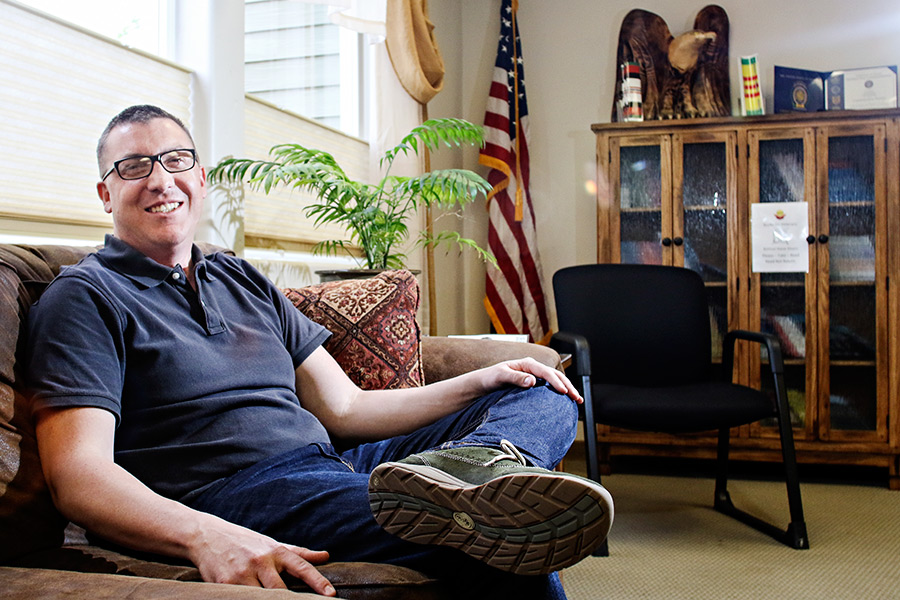Almost six years ago, the Kalispell Vet Center opened its doors to the public with bare walls, a skeleton crew, and a major mission: to help veterans readjust to life out of the service, and to connect them to the services they may need in their transitions back to civilian life.
Jeffrey Heider, a psychologist who has been working with veterans in the valley for decades, was there as the center’s team leader, along with one other counselor. Now, Heider is still leading the team, but it has blossomed to include three counselors and outreach staff, along with a program support assistant.
Larry Cannon, who recently took the job as the outreach program specialist last December, attributed the growth to the natural process of veterans and their families hearing about the center and heading there for services, but he also noted that an expanded list of groups and events have begun to draw even more people. It’s also led to talks about additional office space for the center.
A recent therapeutic fly-tying session, for instance, drew 10 people, and was led not by a member of the staff, but by another veteran.
“We’re trying to get to that next level, to have veterans leading workshops,” Cannon said.
Because really, that’s the point of the vet center, he said. It’s about “keeping the promise,” that after serving the United States in the military, the country will take care of veterans in return.
Vet Centers were first established in 1979 to help Vietnam veterans adjust to civilian life. Those services have been especially important in recent years, with more veterans returning home from the conflicts in Iraq and Afghanistan. Montana has one of the highest rates of veterans per capita in the country, with about 100,000, and 75,000 of those having served in combat zones.
About 9,300 of those veterans live in Flathead County, and another 9,000 live in Lake, Lincoln, and Sanders counties, all of which are in the center’s service area.
To be eligible for Vet Center services, a veteran – and active duty service members, including the National Guard and Reserve – must have served on active duty in any combat theater or area of hostility. Other eligibility criteria include those who have experience military sexual trauma, provided medical or mortuary services, or served on a drone crew with operations in combat zones.
The Vet Center also provides services for veterans’ family members, including bereavement counseling.
One of the major components of the Vet Center is public education, which Cannon said is important for local veterans who might not understand what’s being offered.
The center has added several new therapeutic activities, such as the fly-tying class, which takes place every Tuesday from 2 p.m. to 4 p.m., and the Combat Crochet group, which learns how to use paracords.
“We try to make it as welcoming as possible,” Cannon said.
Other groups include those for spouses and caregivers, recent combat veterans, Vietnam veterans, stress management, and others that connect veterans to each other. That grounding is important, Cannon said, because they didn’t serve in combat alone, and don’t have to readjust alone either.
The center’s two retreats are extremely popular, he said. A group for Iraq and Afghanistan veterans heads to Duck Lake, near East Glacier, in June, and the Vietnam veterans go in September. They go rafting, fishing, hiking, and take part in rituals such as a sweat lodge, and meet every night around the campfire to chat.
“The bonds that are formed are really powerful,” Cannon, who served tours with the U.S. Army in Kosovo and Iraq.
In fact, last year’s Vietnam group didn’t know each other before they went, but formed such a connection that they meet monthly as a regular group.
Most of the staff at the Vet Center are veterans themselves, or have spouses in the service. Cannon said this lends itself to the idea of veterans helping veterans, and brings an extra layer of comfort for those using the services.
The Vet Center is technically part of the embattled Veterans Administration, Cannon said, but it has a separate chain of command running through Denver instead of Helena. The center is also able to keep its records separate from the VA, so the VA couldn’t access them without the veteran’s permission.
Another of the major aspects of the Vet Center is providing information and referrals for veterans, Cannon said, so anyone with questions can give them a call.
He hopes to continue expanding services – new art therapy includes veterans painting facemasks as a way to express their post-traumatic stress – and building connections in the valley for veterans, like fishing outings and projects like Habitat for Humanity.
Coming back from combat can present many challenges, and Cannon said one of the biggest can be seeking out help. He and the staff realize how tough that can be, and hope to ease the stress.
“It’s really important that we provide these opportunities,” he said. “It’s interesting and you never know who’s going to connect.”
To contact the Kalispell Vet Center, call 406-257-7308, or stop by the office at 690 N Meridian Rd., Suite 101.
